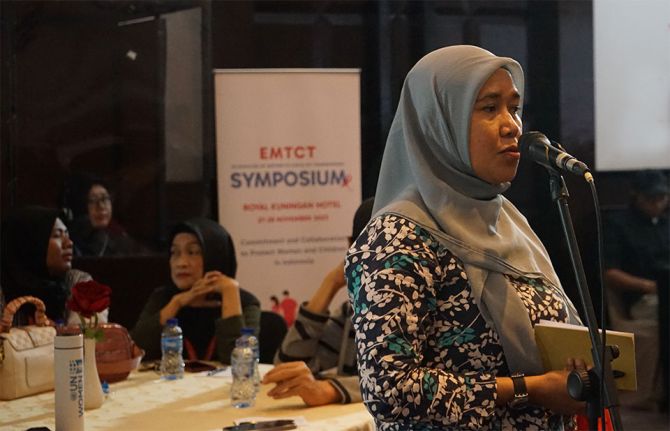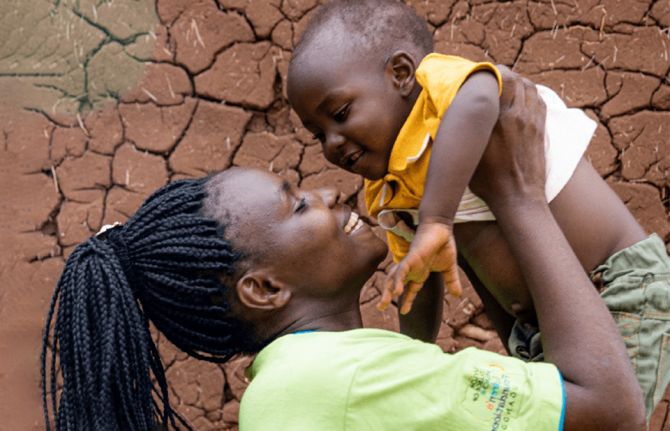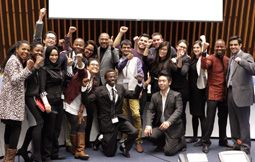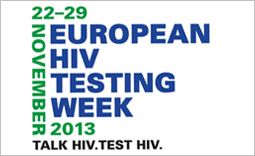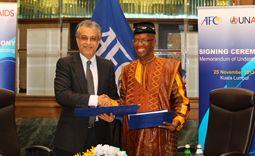
Feature Story
Keeping the promise on ‘mother-to-child transmission-free zones’
21 September 2010
21 September 2010 21 September 2010
Mr Jeffrey Sachs, special adviser to the UN Secretary General on the MDGs and director of the Earth Institute at Columbia University and Mr Michel Sidibé, UNAIDS Executive Director. 21 September, 2010.
Preventing mothers and babies from becoming infected with HIV was the focus at the Millennium Promise 2010 Partners’ Meeting, a side-event organized by the Millennium Promise in conjunction with the MDG Summit.
The aim of the meeting was to assess progress made by the partnerships within the Millennium Villages Project (MVP), an initiative designed to show that MDG targets can be achieved with an integrated and simultaneous package of health and development interventions.
Participants also discussed the way forward to achieve MTCT-Free Zones by 2015, which are regions where mother-to-child transmission of HIV has been eliminated.
In September 2009, UNAIDS, its Cosponsors and the Earth Institute at Columbia University, embarked on a pilot initiative to establish MTCT-Free Zones in villages spread across 10 countries in sub-Saharan Africa. This effort is being carried out through the Millennium Villages Project (MVP).
The meeting highlighted business activities and innovations that have emerged from the MVP, as well as high-profile partnerships supporting these efforts.
By working through the MVP, UNAIDS and the Earth Institute are able to couple the PMTCT initiative with the Millennium Villages’ core work. This collaboration reflects the shared commitment to bring together MVP’s multi-sectoral and evidence-informed development and primary health care strategy with UNAIDS and Cosponsors’ expertise in community and family-centered PMTCT and greater involvement of people living with HIV.
The partnership is yielding good results. Over the past year, all 10 countries where UNAIDS and the MVP are working have brokered relationships, prepared action plans, and commenced activities in the villages. Field teams are addressing systemic barriers such as low antenatal and post-natal care coverage, poor referral systems, poor access to early infant diagnosis services, low male involvement, and stigma.
The collaboration has helped countries to expand their PMTCT approach, increase PMTCT service coverage and enable infected children to be identified earlier, facilitating timely entry to care. The project is being expanded to adjacent villages and districts, and some countries are exploring national scale up.

Feature Story
Country spotlight Botswana: ‘the AIDS response has been catalytic in strengthening our health system’
21 September 2010
21 September 2010 21 September 2010Botswana’s coordinator of the National AIDS Coordinating Agency, Richard Matlhare, shares his thoughts on Botswana’s progress in MDG 6.
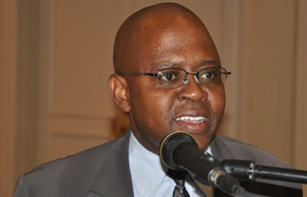
Richard Matlhare of Botswana’s National AIDS Coordinating Agency.
UNAIDS: What would you say is the greatest success to date in Botswana’s AIDS response?
Mr. Matlhare: There are two levels of success: governance and programme performance. In the area of governance, there is strong political will and leadership for the AIDS response. This has translated into domestic financial resource allocation which covers between 70 to 90 percent of the national response needs.
On the programmatic level, success can be seen in the robust antiretroviral treatment and prevention of mother-to-child transmission (PMTCT) programmes that have over 93% and 94% coverage rates respectively. The quality of life for people living with HIV has been enhanced and the number of AIDS deaths averted has significantly reduced by 50% since initiation of the treatment programme. Mother-to-child transmission has been reduced to less than 4%.
Uptake of voluntary counseling and testing services is also high, at 56% among those sexually active, and we have also seen a 90% uptake of testing at health facilities.
UNAIDS: Can you share some of the main obstacles to achieving MDG 6 in Botswana?
Mr. Matlhare: Although we have not been measuring incidence, the proxy indictor of HIV prevalence among 15 to 19 year olds, from ANC Sentinel Surveys, reveals that Botswana has been able to halt the spread of HIV from having an adult HIV prevalence of 24.7% in 2001 to 13.2% in 2009. However, achieving the current national targets of 50% reduction in incidence rates by 2016 is yet to be realized. The recently released “Know Your Epidemic and Response” report shows that low risk heterosexual sex is the main mode of transmission, with contextual factors being the main barrier to behavior change. More focus and efforts are needed to mobilize both communities and individuals for increased and sustained behavior change. But to realize this, a better understanding of the interventions that work best for us is needed.
UNAIDS: How are investments in the AIDS response in Botswana advancing the other MDGs?
Mr. Matlhare: The advent of HIV in Botswana stretched the capacity of our health system, revealing critical gaps that affected health outcomes. The AIDS response has been catalytic in strengthening our health systems. Some of the main benefits include an increase in the number of skilled human resources, the strengthening of the central medical stores in supply chain management, and upgrading of laboratory services. The impact of these improvements is not limited to HIV but across the other health-related MDGs.
Another notable area is the provision of support to orphans and vulnerable children. This has had a direct effect on reducing poverty—MDG 1. Unlike in some countries, Botswana’s AIDS programme does not differentiate between AIDS orphans and non-AIDS orphans; all orphans benefit. In addition, the free provision of antiretroviral treatment means that a person living with HIV does not have to divert his disposable income to purchase these lifesaving drugs. This programme has alleviated poverty and increased life expectancy. These are just a few examples of the impact of the AIDS response on the other MDGs.
UNAIDS: Should Botswana’s AIDS response be addressed as a stand alone public health issue or in tandem with other global health movements?
Mr. Matlhare: The focus on HIV in the first national strategic framework was critical to galvanize and mount an effective response, and we should be careful not to lose focus on the gains of addressing HIV as a stand alone health issue. However, as we enter into the era of the second national strategic framework, there is a need for a more holistic approach through integrated service delivery while still utilizing a multi-sectoral approach. This will ensure that the gains so far are consolidated while cost efficiency and economies of scale are achieved.
UNAIDS: What is happening in Botswana to make HIV prevention a priority?
Mr. Matlhare: In our new HIV policy and the second national strategic framework, prevention has been singled as the top priority. In addition, Botswana has developed a prevention plan that provides guidance to all stakeholders. To ensure success at the community level, partners have been mobilized to embark on proven prevention initiatives. The country is fully committed to increasing prevention resource allocation to match this prioritization. For instance, male circumcision has been adopted and its roll-out will complement other prevention efforts.
External Links
Related

Feature Story
Rethinking linkages between the MDGs: Botswana leads the way
21 September 2010
21 September 2010 21 September 2010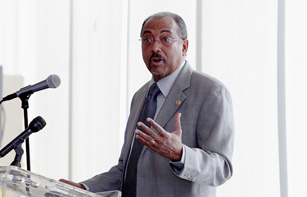
UNAIDS Executive Director Mr Michel Sidibé, 21 September, 2010. Credit: UNAIDS/Hamilton
There is now global recognition that one Millennium Development Goal cannot be achieved without the others. The health sector, in particular, has realized that responses to Millennium Development Goals 4, 5 and 6—to reduce child mortality, improve maternal health, and combat HIV malaria and other diseases—must be tackled together to improve people’s life.
At a side event of the UN Millennium Development Goals Review Summit taking place from 20 to 22 September in New York, Botswana shared its experiences in integrating health interventions and programmes in order to maximize resources and improve health outcomes.
Botswana, a country with an HIV prevalence of 23.9% in its adult population, has recently made progress in curbing the epidemic. Data shows that HIV prevalence among young people aged 15-24 years has been declining consistently since 2001. The country has also managed to tackle child mortality through expanded feeding programs for children under five together with near universal coverage of services to prevent mother-to-child transmission of HIV.
At the event, entitled “Toward an Integrated approach to Attaining Health Related Millennium Development Goals,” Mr Mompati S. Merafhe Vice President of Botswana, presented the country’s case to show what integrating health services means in practice.
According to Vice President Merafhe, Botswana was able to mount a credible response to AIDS, and strengthen health systems through an integrated approach. He stressed the importance of partnerships, including that of the United Nations.
“We have crated an enabling environment and we have closed gaps that take us on the road to reach the MDGs by 2015,” said Vice President Merafhe. “This has resulted in our success in preventing mother-to-child transmission of HIV.”
Research shows that countries with the highest incidence of HIV often have a high unmet need for family planning. Offering HIV services and contraceptives at the same facility, or even by the same health care worker, increases the opportunity to access services.

Mr Mompati S. Merafhe Vice President of Botswana, 21 September, 2010. Credit: UNAIDS/Hamilton
According to the panellist, the benefits of integrating services are many: combining interventions at point-of-care, as well as sharing a supply chain, and information systems are all examples of how resources can maximized. Importantly, they stressed the process also decreases out-of-pocket costs for the individual, through reducing the number of visits to health centres, thus minimizing travel time and cost, as well as fees associated with accessing services.
“As has been shown by Botswana’s leadership, the AIDS response can be the bridge that connects movements,” said Michel Sidibé, UNAIDS Executive Director. “Programmes advancing maternal and child health, sexual and reproductive health, gender equality, sexual violence all contribute to achieving the MDGs.”
To assess the way forward the session included a range of topics on health service integration. Mr Erik Solheim, Minister of Environment and International Development of Norway gave the donors perspective. UNAIDS, UNICEF and UNFPA discussed the benefits of integration from the bilateral outlook. The Elizabeth Glaser Paediatric AIDS Foundation (EGPAF) gave further insights from the implanting organizations point-of-view.
While there are many benefits of integrating health services, integration is not a “one-size-fits-all” strategy, according to the participants. For example, countries with a weak health system, integrating services may overburden an already stretched system. The process of planning and implementing integrated services also poses a number of technical challenges for governments, policy donors, program implementers, and health care workers.
Related

Feature Story
Cambodia takes MDG prize for excellence in its AIDS response
20 September 2010
20 September 2010 20 September 2010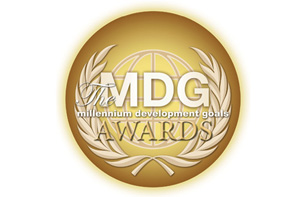
At a ceremony held in New York on the eve of the Millennium Development Goals (MDG) Summit, the Kingdom of Cambodia was presented with an MDG Award for its outstanding national leadership, commitment and progress towards achievement of Goal 6 and particularly in working towards halting and reversing the spread of HIV.
Honoured within the ‘Government’ category of the annual Awards initiative, Cambodia is recognized for efforts on HIV that have contributed to a decline in HIV prevalence from an estimated 2% (among adults aged 15-49) in 1998 to 0.8% in 2008. The country has also achieved the universal access target for antiretroviral treatment, with over 90% of adults and children in need receiving treatment.
In selecting Cambodia, the MDG Awards Committee was particularly impressed with Cambodia’s successful scale-up of programmes, grounded in strong national leadership on HIV, the solid National Strategic Plan and collaborative partnerships, and adhering closely to the ‘Three Ones’ principles.
“We are honoured to receive this award as important recognition of the joint efforts to address HIV in Cambodia,” said H.E. Dr. Teng Kunthy, Secretary-General of the Cambodia National AIDS Authority. “This outstanding success has been brought about by strong political support, leadership and commitment of the Royal Government of Cambodia in solid partnership with and support by UN agencies, civil society, the private sector and all development partners – a partnership which we will continue to strengthen towards even greater results.”
“We congratulate Cambodia on this Award. This underlines how a well-coordinated, multi-sectoral response with commitment by all partners can lead to significant progress on HIV,” said Douglas Broderick, the UN Resident Coordinator in Cambodia.
Innovative HIV prevention programming in Cambodia over the last ten years has included the introduction of the 100% Condom Use Policy, which showed successes in preventing new infections. Targeted education programmes for key affected populations have reached an estimated 90% of sex and entertainment workers and men who have sex with men.
Progress has also led to impact on the other health-related MDGs of reducing child mortality and improving maternal health. Scale-up of HIV services has contributed to a nearly 50% decrease in HIV prevalence among pregnant women at antenatal clinics. In 2009, over 32% of HIV-infected pregnant women received treatment to reduce the risk of mother-to-child transmission of HIV – an increase from 11.2% in 2007.
Heralding the effective partnership between the government and other stakeholders engaged in the national response, the UNAIDS Country Coordinator for Cambodia, Tony Lisle, underlined the need for sustained, evidence-based and well-coordinated efforts.
“HIV is still a very real challenge in this country, and stigma and discrimination remain high,” said Mr Lisle. “We must now work together to ensure we continue reaching key people at risk and those affected by HIV through initiatives grounded in human rights. For Cambodia to stay ahead of its epidemic, we have to build further on the achievements made.”
The MDG Awards are held annually to support and raise awareness of the MDGs by providing a high profile platform to honour and celebrate exemplary efforts by national governments and civil society stakeholders in advancing the MDGs.

Feature Story
Integrating the MDGs: delivering for girls, women and babies
19 September 2010
19 September 2010 19 September 2010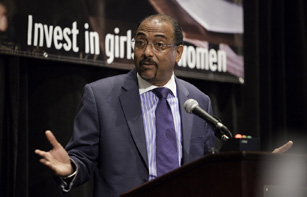
Mr Michel Sidibé UNAIDS Executive Director speaking at the Women Deliver meeting ahead of the MDG summit, 19 September 2010. Credit: UNAIDS/Hamilton
Ahead of the opening of the Millennium Development Goals (MDGs) Summit at the UN in New York City, General Assembly delegates gathered today for a dialogue with bilateral donors, non-governmental organizations (NGOs), First Ladies, youth leaders and the private sector on how to secure the resources and political will needed to achieve the MDGs—with specific focus on delivering solutions for women, girls and babies.
The event, Accelerating Action on the MDGs: Delivering for Girls, Women and Babies, was organized by the global advocacy organization Women Deliver, and co-sponsored by UNFPA, WHO, World Bank and UNAIDS. Speakers included Ms Graça Machel, renowned international advocate for women’s and children’s rights, Mr Michel Sidibé, Executive Director of UNAIDS, and Ngozi Okonjo-Iweala, a managing director with the World Bank.
‘Achieving the MDGs is possible’
The speakers presented compelling cases for the possibility of achieving the MDGs, if the world’s leaders make the necessary resources available. With 110 million children not having access primary education—of which two thirds are girls—and women being disproportionally represented among the 1.4 billion people living below the poverty line, many of the MDGs seem far from attainable.
“This agenda will never succeed, if it remains only in the hands of us here in New York. It must be owned at the country level, by every head of state, every woman and every girl,” said Ms Machel.
Yet, the AIDS movement has effectively demonstrated that achieving the MDGs is possible: countries such as Botswana and Namibia are close to reaching the goal of virtual elimination of mother-to-child transmission of HIV; and, twenty-two of the most affected countries in sub-Saharan Africa have reduced new HIV infections by more than 25%. Key steps have been taken to stop and reverse the spread of HIV by 2015, as MDG 6 reads.
Integration of the MDGs
According to Mr. Sidibé, it is clear that investing in one MDG will help achieve the others. “Where HIV is prevented, maternal mortality decreases. When a mother’s life is saved; a newborn’s life is usually saved. When girls are educated, poverty decreases.” Mr Sidibé added that the AIDS response should be a bridge for joining health and development movements, such as maternal and child health, sexual and reproductive health, and women’s rights. “For me, it is clear: no progress on the MDGs without integration,” he said.
Other speakers at the event included Fred Sai, Ghanaian Family Health Physician, Mikkel Vestergaard Frandsen, CEO of Vestergaard Frandsen SA, and Imane Khachani, of the Youth Coalition for Sexual and Reproductive Rights, Morocco. After each speaker, the audience discussed in small groups the challenges and shared their views and strategies on how they can be met and the way forward. The results of the discussions will be posted on the Women Deliver website.
Publications

Feature Story
Germany contribute 4 million euro to the AIDS response
17 September 2010
17 September 2010 17 September 2010
Credit: StV-AT
On the 16 of September 2010, Permanent Representative of Germany to the United Nations in Geneva, H.E Ambassador Reinhard Schweppe and UNAIDS Executive Director Mr Michel Sidibé signed an agreement for Germany to continue supporting the work of UNAIDS. Germany will provide a total of € 4 million over the next two years.
The continuation of cooperation marks an appreciation of the Federal Government for the work of UNAIDS,” said Ambassador Schweppe.

Credit: StV-AT
While Germany is one of the top ten total contributors to UNAIDS Mr Sidibé stressed that that the cooperation with Germany is not only based on funding. “This is a true partnership,” Mr Sidibé said.
GTZ, The German Technical Cooperation, is a key implementing partner on the ground in many countries with high HIV prevalence working directly with communities most affected by the epidemic.
The federal Government of Germany contributes more than € 500 million per year towards AIDS, tuberculosis and malaria as well as work towards strengthening health systems, and is a strong supporter of the Global Fund to Fight AIDS, Tuberculosis and Malaria.
Related

Feature Story
MDG 6: Six things you need to know about the AIDS response today
17 September 2010
17 September 2010 17 September 2010
There is a lot to be hopeful for as the milestone of reaching the Millennium Development Goals by 2015 is approached. Much has been achieved—fewer people are dying of AIDS-related illnesses and the rate of new HIV infections has fallen by more than 17% since 2001.
This new report provides an overview of six key aspects of AIDS response today:
- New HIV infections are falling.
- More than 5 million people are on HIV treatment.
- HIV prevention works.
- Virtual elimination of mother-to-child transmission is possible by 2015.
- Criminalization is challenging the AIDS response.
- Investing for AIDS is a shared responsibility.
Read the full report .
Related

Feature Story
Country spotlight Kazakhstan: ‘Funding and planning a key priority for response’
15 September 2010
15 September 2010 15 September 2010Maksut Karimovitch Kulzhanov, the head of Kazakhstan’s Public Health Institute and representative for Eastern Europe on the Board of The Global Fund, shares his views on Kazakhstan’s progress
towards MDG 6.

Maksut Karimovitch Kulzhanov, the head of Kazakhstan’s Public Health Institute.
UNAIDS: What would you consider Kazakhstan’s biggest achievement in its HIV response?
Mr. Kulzhanov: I would mention several successes. First, the epidemic in our country is being contained at the concentrated stage and roughly at the same level. Second, public funding of the AIDS response is steadily increasing, and even though these resources are still inadequate, we can consider it as an achievement, seeing ten years ago we didn’t have them at all. In my opinion, an important development is the enhanced work with vulnerable populations and the growing support provided by the government to NGOs. The new law adopted to promote the activities of NGOs is facilitating involvement of civil society in outreach work, which is one of top priorities for Kazakhstan.
UNAIDS: What are the main obstacles for achieving MDG 6 in Kazakhstan?
Mr. Kulzhanov: The main obstacles are probably similar to those found in other countries, such as the complexity of working with vulnerable populations and making the various governmental bodies and authorities understand certain aspects of the epidemic. There are also problems with access to treatment. Today, Kazakhstan doesn’t have the capacity on its own to provide antiretroviral treatment to all who are in need. This is where assistance provided by The Global Fund is crucial, as it helps to maintain treatment coverage at an acceptable level.
UNAIDS: Do you believe that investments in Kazakhstan’s AIDS response contribute to achieving the other MDGs?
Mr. Kulzhanov: Investments into the AIDS response in Kazakhstan is targeted to activities in this specific area. As to other MDGs, in particular decreasing child mortality and maternal health, the government is making serious efforts in this area and some progress has been made. These goals are also a priority for Kazakhstan, which adopted three years ago the WHO criteria, as well as their methodology and approaches. This is already yielding good results.
UNAIDS: What can be done to change the course of Kazakhstan’s HIV epidemic?
Mr. Kulzhanov: A very important aspect is the funding and planning of the response. Unfortunately, in our region – and in Kazakhstan specifically – the governments do not yet have the capacity to ensure funding of the response, and not infrequently they also lack the relevant know-how in this field. That is why we attach great importance to working with The Global Fund, which is virtually the only agency that can make a real impact in terms of funding the response. On the other hand, it is important to work with other international organizations, such as UNAIDS, which provide crucial technical and consultative support.
As a representative of our region on Board of The Global Fund the number one task today is to change the criteria that were adopted by The Global Fund a few years ago and that are now severely restricting our countries in their eligibility for grants. The categories of countries as defined by the World Bank based on their income do not always reflect the reality in all its complexity.
In our region, where the gap between the rich and the poor is very wide, and the overall situation in terms of well-being is rather good, certain populations live in deep poverty. It is exactly within these population groups that the epidemic is spreading especially fast. This is what is overlooked in The Global Fund criteria. We must do everything to change these criteria, so that The Global Fund works for all countries. This is particularly important for our region, which is just a step away from a generalized epidemic.
UNAIDS: What is being done in your country to prioritize HIV prevention?
Mr. Kulzhanov: Our official programmes list HIV prevention among the five programmatic priorities but a lot remains to be done, for example in the area of HIV prevention among migrants. Migration in the region is on the rise. There are legal migrants and illegal migrants, with the latter often being in the majority. They are completely isolated from all services – no access to medical services, education and information. When we conducted a pilot survey at one of the large markets in Almaty, it revealed that among the migrants, mostly represented by sexually active young people, many simply do not know about condoms or other means of protection. So a lot needs to be done in this area. Overall, we lack coordination and better multi-sectoral interaction. We must join efforts at all levels.
Related

Feature Story
Maternal deaths worldwide drop by a third
15 September 2010
15 September 2010 15 September 2010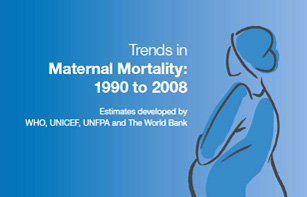
The number of women dying due to complications during pregnancy and childbirth has decreased by 34% from an estimated 546 000 in 1990 to 358 000 in 2008, according to a new report, Trends in maternal mortality, released by the World Health Organization (WHO), the United Nations Children's Fund (UNICEF), the United Nations Population Fund (UNFPA) and the World Bank.
Despite this notable progress, the annual rate of decline is less than half of what is needed to achieve the Millennium Development Goal (MDG) target of reducing the maternal mortality ratio (the number of deaths per 100,000 live births) by 75% between 1990 and 2015. This will require an annual decline of 5.5%: the current average annual decline of just 2.3%.
"The global reduction in maternal death rates is encouraging news," says Dr Margaret Chan, the Director-General of WHO.”No woman should die due to inadequate access to family planning and to pregnancy and delivery care."
For nations with high HIV prevalence, AIDS has become a leading cause of death during pregnancy and after the birth. There is also some evidence that women living with HIV are at greater risk of maternal death. Overall, it was estimated that there were 42 000 deaths due to AIDS among pregnant women globally in 2008. About half of those are estimated to be maternal. The contribution of HIV was highest in sub-Saharan Africa where 9% of all maternal deaths were AIDS-related.
“Integrating HIV services with maternal and sexual and reproductive health services is imperative to stop mothers from dying and babies from being born with HIV,” said Mr Michel Sidibé, UNAIDS Executive Director. “The AIDS movement must be leveraged to achieve reductions in maternal and child mortality.
According to the report pregnant women die from four major causes: severe bleeding after childbirth, infections, hypertensive disorders, and unsafe abortion. Every day, about 1000 women died due to these complications in 2008, more than half in sub-Saharan Africa. The risk of a woman in a low-income country dying from a pregnancy- related cause during her lifetime is about 35 times greater than a woman living in a high-income country.
"To achieve our global goal of improving maternal health and to save women's lives we need to do more to reach those who are most at risk," says Anthony Lake, Executive Director of UNICEF. "That means reaching women in rural areas and poorer households, women from ethnic minorities and indigenous groups, and women living with HIV and in conflict zones."
The new estimates show that it is possible to prevent many more women dying. Countries need to invest in their health systems and in the quality of care.
"Every birth should be safe and every pregnancy wanted,” says Thoraya Ahmed Obaid, the Executive Director of UNFPA.The lack of maternal health care violates women's rights to life, health, equality, and non-discrimination.
UN agencies, donors and other partners have increasingly coordinated their assistance to countries, focusing on those with the greatest burden.
According to Tamar Manuelyan Atinc, Vice President for Human Development at the World Bank, “Given the weak state of health systems in many countries, we must work closely with governments, aid donors and agencies, and other partners to strengthen these systems.

Feature Story
Young MSM and transgender people are raising their voice
10 September 2010
10 September 2010 10 September 2010
Participants at the ‘Youth Voices Count’ consultation. Credit: World AIDS Campaign
Young men who have sex with men (MSM) and transgender people in Asia and the Pacific region are calling for governments, donors and partners to ‘make youth voices count’ by increasing focus and programming of national HIV responses to include their opinions and needs.
A growing body of data has documented exceptionally high transmission rates among men who have sex with men and transgender people in Asia and the Pacific region.
Men who have sex with men in Asia face nearly one in five odds of being infected with HIV and are estimated to account for roughly half of the national epidemic in many of the small Pacific Islands. In the larger nations of Australia and New Zealand, men who have sex with men is by far the largest transmission category for both HIV prevalence and incidence. Among transgender people, HIV prevalence has been found to range from 10% to 42% in five Asian countries.
Now we have a forum where young MSM and transgender can really contribute – this is very important
Hender Gercio, HIV activist from the Philippines
Held over three days in Bangkok, Thailand, the group discussed key issues including HIV vulnerability, self-esteem, access to relevant and appropriate services and information, education and human rights abuses of young MSM and transgender people in the region, presenting recommendations for action to international partners.
“Young voices – and particularly ours – have not been heard for the longest time in the AIDS response. It is crucial we become empowered. Now we have a forum where young MSM and transgender can really contribute – this is very important,” said Hender Gercio, a student and HIV activist from the Philippines.
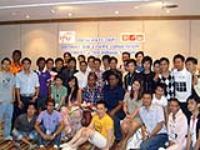
Participants of the ‘Youth Voices Count’ youth MSM and transgender consultation. Credit: World AIDS Campaign
Key areas identified as hindering the involvement of young MSM and transgender in the AIDS response includes stigma and discrimination, lack of resources and support in education and ‘self-issues’.
Recommendations for immediate action by the group included the need to:
- Increase and improve data collection on the needs, challenges and social complexities faced by young MSM and transgender people, particularly those living with HIV.
- Adapt the sexuality education agenda to give full information on sexual orientation and gender identity.
- Conduct qualitative studies/rapid assessments on the self issues of young MSM and transgender people.
- Ensure representation of young MSM and transgenders in sub-regional and regional MSM and transgender networks.
- Encourage training on issues of young MSM and transgender people among health care workers, to reduce stigma and discrimination and increase access to HIV and health services
Empowering young people and MSM and transgender people to protect themselves from HIV infection are central priorities for UNAIDS. MSM and transgender people face violence and discrimination across the world. In some countries they face imprisonment and even the death penalty.
The consultation represents a timely opportunity to reflect on the struggle that many young MSM and transgender people face in advocating for and taking control of their own health, particularly concerning HIV and sexual health
Anthony Lake, Executive Director of UNICEF
“The consultation represents a timely opportunity to reflect on the struggle that many young MSM and transgender people face in advocating for and taking control of their own health, particularly concerning HIV and sexual health,” said James Gray, Australian Youth Ambassador for Development, working with the UNAIDS Regional Support Team in Bangkok. “This is an important step towards strengthening the response by creating a space for this group to be involved in a meaningful way,” he added.
As a result of the consultation, co-organized by the World AIDS Campaign and Dutch-based NGO Hivos, and supported by UNAIDS, further resources will be made available to support MSM youth groups in the region to ensure this momentum is maintained. The group will continue to share experiences, and will reconvene in 12 months. The full consultation and report summary and recommendations can be requested and downloaded from www.worldaidscampaign.org or www.hivos.nl.
20100910_FS_MSM
Feature stories:
International Day Against Homophobia (17 May 2010)
Report calls for urgent scale-up of MSM strategies to prevent HIV in Asia Pacific (28 May 2010)

